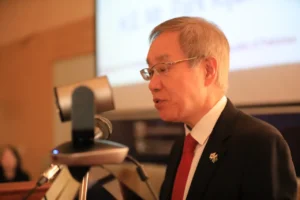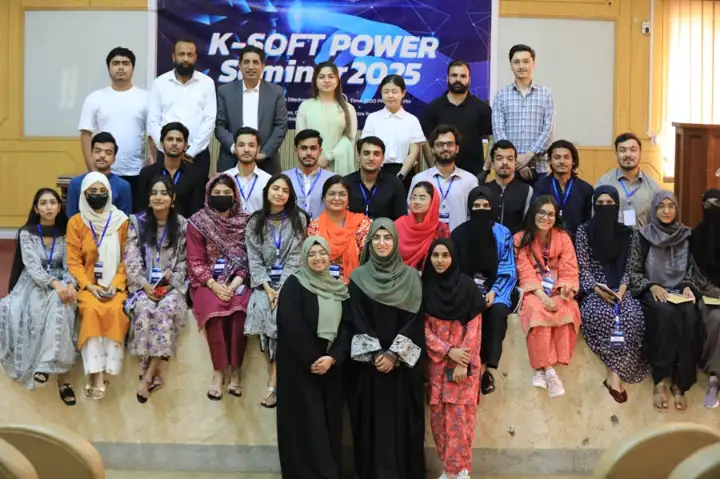Islamabad, April 9: Organized by the Embassy of the Republic of Korea in collaboration with the Quaid-i-Azam School of Management Sciences (QASMS), the K Soft Power Seminar 2025 brought together thought leaders, academicians, and students to explore the growing influence of Korean culture in Pakistan and its broader implications for international relations.

In his opening remarks, His Excellency, the Ambassador of the Republic of Korea, emphasized the enduring friendship between Korea and Pakistan.
He highlighted the widespread love of Korean dramas and music among Pakistani audiences, noting that these cultural elements have the remarkable ability to build bridges between hearts and minds across borders.
The Ambassador stressed that culture is a powerful diplomatic tool that not only entertains but also strengthens international bonds.
Read more: Korean ambassador stresses boosting trade with Pakistan
Academic and Diplomatic Endorsements
The seminar saw robust participation from academia as well. Professor Dr. Zafar Nawaz Jaspal, Dean of the Faculty of Social Sciences at Quaid-i-Azam University, lauded the deep-rooted relationship between Korea and Pakistan.
Dr. Jaspal shared that the growing presence of Korean students at Quaid-i-Azam University is a clear indicator of the strengthening cultural and educational ties between the two nations.
He pointed out that the influence of Korean soft power has positively impacted various facets of Pakistani society, encouraging further academic and cultural exchanges.
Read more: Pakistan And South Korea Aim To Boost Their Bilateral Trade Volume Through Enhanced Cooperation
Insights from Korea’s Cultural Experts
One of the seminar’s highlights was the session led by Ms Alex Choi, a distinguished team leader of global business strategy at the Korea Creative Content Agency.
Ms Choi spoke passionately about the dynamic youth population in Pakistan and the untapped potential for bilateral cultural collaboration.
She underscored that Korean culture is not just about entertainment but an influential force that can drive innovation, creativity, and entrepreneurship in Pakistan.
Adding a personal touch to the discourse, Mr. Zahid Hussain, a Pakistani broadcaster residing in Korea and President of the Global Korea Scholarship Alumni, shared his experiences of living and working in Korea.
His narrative provided a real-world perspective on how Korean soft power and cultural influence have shaped his journey.
Engaging the Next Generation
Students actively participated in discussions and Q&A sessions, indicating a robust interest in exploring the broader implications of cultural diplomacy.
In addition, attendees received souvenirs that further celebrated the unique blend of Korean and Pakistani cultures.
The K Soft Power Seminar 2025 is a reminder that cultural diplomacy is a powerful force that can unite diverse communities and build sustainable bridges between nations.
As Korea and Pakistan continue to explore collaborative opportunities, such initiatives will improve regional integration and lead to a more connected global community.
READ MORE: Dow University Celebrates 190th Liver Transplant Milestone









